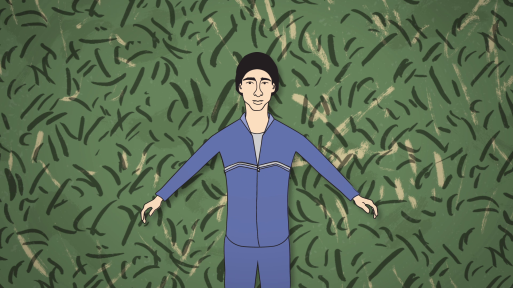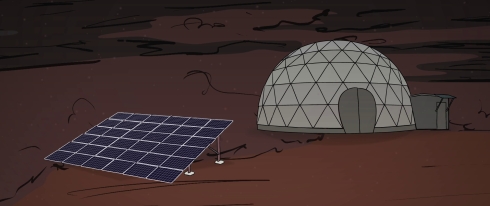[Version française sur le site de La Recherche]
Here we are… past the halfway mark. The last time we went outdoors, the last time we talked to a friend, the last time we had a fresh fruit… All this was sixth month ago. Next times are six month away.
I’ve received this question quite a few times, recently: am I looking forward to coming back? But to be honest, I had never really asked myself. We are busy from the time we leave our bed to the moment we go back to it, and being melancholic is not on top of my to-do list.
So, let’s see…
On one side, there are things I will be delighted to come back to. First, people: it will be great to see my family again, and to spend evenings listening to what my friends have accomplished in a year. Actually, even hearing the voice of someone who is not one of my five crewmates sounds exciting. Not that I don’t enjoy being around them; the 5 of them are brilliant and passionate. They’ve been selected for that. But after six months without talking to anyone else, some diversity in my social interactions would be highly stimulating.
Then, it will be such a pleasure to come back to the open air! Walking against the wind, having lunch under the sun, lying in the grass, swimming in a lake… I will even enjoy the rain. No, I will likely not spend much time indoors next September. There are also little, very simple pleasures I will be happy to rediscover: a fresh orange, a glass of good wine, a warm shower…

On the other side, I much enjoy some aspects of the daily life here. You might think that, after six months together all the time, my crewmates and I don’t have much to tell each other anymore. And it is true that if I ask one of them how their day was, or whether anything interesting has happened to them lately, I will receive either a suspicious look or a sarcastic answer. But my crewmates and I come from very different cultures and backgrounds, and we have a lot to teach each other. I learn, from experts, skills in areas ranging from field geology to music theory.
I also enjoy the freedom to manage my time exactly as I wish: I can use the lab at whatever time of the day or night, do sport in-between two experiments, or play music while the centrifuge is running. If I want to work when I am the most productive (usually in the early morning and late evening) and catch up on sleep in the afternoon, I don’t have to worry about who I should justify it to, opening hours, or a lab’s security guard.
There are also habits and rituals I like here. My duets with Christiane, her with her harmonica and I with my ukulele. The jokes that make us laugh uncontrollably but will only trigger polite smiles or shocked looks outside the dome. Our salsa evenings, our workout sessions…
And there are things I’m happy to go without. Running errands, for instance; I don’t have to go farther than the Sea Can if anything is missing in the kitchen. Or, time lost in traffic jams; here, my longest commute takes 3 minutes if I stop by the bathroom.
Generally speaking, I much enjoy being here. Yes, there are some difficulties, but working towards an objective that is so meaningful to us helps overcoming them.

That being said, I know that the hardest is still to come: the third quarter just started. Based on what we know from polar and space stations, our mental health, relationships and performances are likely to drop around… now. This phenomenon, well known in human sciences dealing with extreme environments, was dubbed « third-quarter syndrome ». Possible symptoms include emotional instability and hypersensitivity, loss of motivation, depression, and apathy. Yay.
I don’t know how much we’ll be affected, but some signs are present. Subtle signs, because my crewmates are not the kind of people who will complain or let themselves be discouraged easily. When they suffer, they hide it. But tensions between crewmembers have become more frequent and more intense.
I have a tendency to be very direct; if something you’re doing annoys me, I will let you know. We will talk about it and, once everything has been said, come back to a healthy relationship. On the contrary, some people tend to avoid arguments at all cost, trying to ignore resentment even when it makes them nauseous. If that can be a safe strategy in the short term, it can harm in the long term. Especially given that, as we can’t cool down by spending time alone, having a walk outside or talking to someone neutral, tensions eventually come out. And at that point, they have grown intense.
Part of those tensions can be explained by the fact that people unveil themselves more and more: if hiding your flaws and weaknesses is easy for a few weeks, it is much harder to do so for months. If you are self-centered and manipulative, or if your courage tends to fail in tough times, your crewmates will know it. Another factor is that, as time goes by, it becomes more and more difficult to put up with little things in others that you barely paid attention to in the beginning. A crewmate of mine, for instance, will become highly annoyed by another’s inaccurate assertions claimed in an overconfident tone.
Overall, our social situation is pretty good given the circumstances: we all keep relationships at least professional with each other. And in most cases, much better than professional.
The next few months might be the most interesting to the researchers who study us. What happens when the initial excitement is gone, when crewmembers reveal themselves and when monotony, confinement and isolation weigh the most upon the team?



Since I learned of your mission a few weeks ago, I have caught up on all the crew blogs. Fascinating. And I have enjoyed getting to know you all a little bit. One question that occurs to me: do you read each others blog posts? I have noticed some of you are very diplomatic, others somewhat less so. I wonder if this is a cause of tensions.
LikeLike
Hello Jeff,
Thank you for this comment.
Yes, we do read each other’s blog posts; not systematically, but most of the time.
I don’t think blogs are a source of tension – at least, it was never brought up as such – but differences in diplomacy levels may be.
LikeLike
Quelle belle façon de voir les choses, après 6 mois confinés la plupart d’entre nous seraient sans doute impatients de retrouver “la Terre” et tous ce qu’elle nous offre au quotidien.
Pas facile d’évoluer dans un univers désertique avec seulement 5 compagnons et pourtant on voit bien que vous n’oubliez jamais le caractère exceptionnel et passionnant de cette expérience.
Je croise les doigts pour que ce troisième quart de l’expérience échappe aux prévisions et que l’ambiance au sein du dôme ne se dégrade pas significativement.
Et surtout bon courage pour ces derniers mois dans le dôme !
LikeLike
Bonjour Justine,
Merci pour ce sympathique message ! C’est un plaisir de vous compter parmi mes lecteurs.
Excellent weekend,
Cyprien
LikeLike
Being a submariner I can relate quite a bit on isolation. The longest we were ever underway for was only about 90 days. Email was sent and received once a day when the boat came up to periscope depth so there was always a delay when communicating. We worked on an 18 hour cycle rather than 24. 6 hours on watch, 6 hours off, and 6 hours for sleep. It didn’t always work that way but that’s what was on paper. You were doing 12 hours a day standing your watch station and work often crept into your 6 hours off. Our atmosphere had to be monitored and managed using an amine based CO2 scrubber system and oxygen candles or cracking water into hydrogen and oxygen with the H2 being discharged overboard. You have more room and not so many people but have to deal with the feelings of isolation and the interpersonal diplomacy when boredom and frustration come up.
We were also all sleeping within 150ft of an operational nuclear reactor and would often walk within 15ft of it as we were going aft into the engine room or coming forward. We were constantly drilling for emergencies for all kinds of situations including a nuclear.
With the odd schedule it was easy to lose track of time. It was just one watch after another blurred together after a while and you only knew what day it was by the time on our consoles or if it was day or night by the dimming of the lights at night. It was an odd world and stressful at times. Heading out on a deep space voyage would have it’s own unique aspects but the isolation remains.
LikeLike
That must be such an adventure… I hope to do have at least one submarine exploration experience in the future.
Thanks for sharing your story!
LikeLike